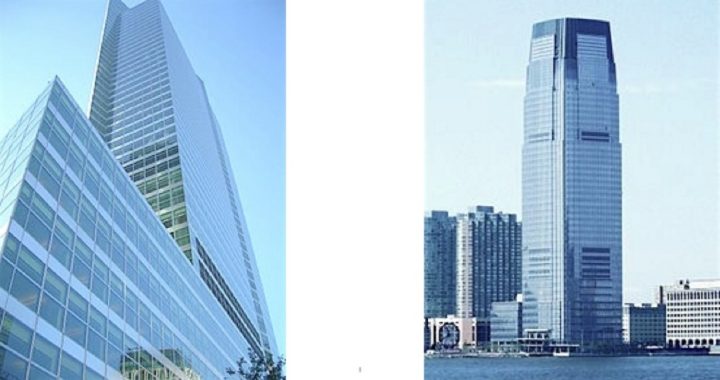
The U.S. Justice Department has announced that it will not be prosecuting Wall Street firm Goldman Sachs or its employees following an investigation into financial fraud. A Senate panel had been investigating allegations that Goldman marketed four sets of risky mortgage securities without informing their clients that the securities were risky.
The Senate panel, chaired by Senator Carl Levin (D-Mich.), asserts that Goldman Sachs bet against investors’ positions and tricked investors about those positions in order to shift the risk.
According to the Justice Department, officials “have determined that, based on the law and evidence as they exist at this time, there is not a viable basis to bring a criminal prosecution with respect to Goldman Sachs or its employees in regard to the allegations set forth in the report” from the Senate subcommittee.
The statement continued, “The department and investigative agencies ultimately concluded that the burden of proof to bring a criminal case could not be met based on the law and facts as they exist at this time.”
Despite the DOJ’s assertions that there is not enough evidence to bring a criminal prosecution against Goldman Sachs, Goldman Sachs agreed to pay $550 million in civil fraud charges after the SEC determined that the company had in fact misled its investors. That agreement applied to one of the four deals that were being investigated by the Senate subcommittee. And Goldman employee Fabrice Tourre is still facing a civil complaint from the SEC.
The DOJ did add that the decision could change if new evidence were to emerge. “If any additional or new evidence emerges, today’s assessment does not prevent the department from reviewing such evidence and making a different determination, if warranted,” the statement said.
The investigation from the Senate panel revealed several emails from Goldman Sachs employees wherein they spoke of the complex mortgage securities sold to banks and investors as “junk” and “crap.” Levin indicated that he believed the company’s employees “misled the Congress” and that Goldman Sachs “gained at the expense of their clients and they used abusive practices to do it.” He also questioned whether employees were being truthful in their testimony regarding whether the firm encouraged investors to purchase securities that employees knew would fail.
Goldman Sachs CEO Lloyd Blankfein asserted that the company was not guilty of betting against its clients.
The announcement from the DOJ was the second piece of good news that Goldman Sachs received that day. The Washington Post explains, “The Justice Department’s decision capped a good day for Goldman as the Securities and Exchange Commission decided not to file charges against the firm over a $1.3 billion subprime mortgage portfolio.”
But the Justice Department’s decision could hurt the Obama administration, particularly during an election season in which the president is attempting to portray himself as an anti-corporatist.
Obama’s relationship with Goldman Sachs has been a closely intertwined one, however. The following Goldman Sachs people have either worked for or are currently working for Obama’s administration: William Dudley, president of the Federal Reserve of New York, is a managing director and partner of Goldman Sachs; Gary Gensler, chairman of Commodity Future’s Commission, spent 18 years at Goldman Sachs; Mark Peterson, chief of staff to Treasury Secretary Timothy Geithner, is a former lobbyist for Goldman Sachs; Philip Murphy, nominated for ambassador to Germany, is a former Goldman executive; and Diana Farrell, Deputy Director to the National Economic Council, was formerly with Goldman Sachs. These are just a few of the many Goldman Sachs associates who can be found in the Obama administration.
Additionally, Goldman Sachs purchased 10 percent of the Chicago Climate Exchange in 2006 after President Obama had orchestrated a transfer of funds from the Joyce Foundation to the Chicago Climate Exchange when he served as an influential board member of the Joyce Foundation. Goldman Sachs had a vested interest in Obama’s push for cap and trade when he became president.
In 2008, Goldman Sachs was one of Obama’s top campaign donors, pouring over $1 million into his campaign coffers.
In 2012, however, Goldman Sachs has switched gears. Business Week reports:
Four years ago, employees of New York-based Goldman gave three-fourths of their campaign donations to Democratic candidates and committees, including presidential nominee Barack Obama. This time, they’re showering 70 percent of their contributions on Republicans.
And Goldman Sachs is not the only one. Thirteen other companies are following suit.
Rogan Kersh, provost at Wake Forest University in North Carolina, noted, “A switch in party preference of this magnitude is virtually unheard of among major companies with an established presence in Washington.”
Analysts believe that Goldman Sachs’ sudden change of allegiance could be enough to compel the Obama administration to reconsider an investigation into the firm.
The Government Accountability Institute (GAI) released a report recently which determined that the failure of President Obama and Eric Holder to criminally charge Wall Street bankers is a result of collusion because political donations made to Obama’s campaign.
The Daily Caller reports:
Despite Obama’s and Holder’s “heated rhetoric” against Wall Street (in 2009, Obama blamed the 2008 financial collapse on “reckless speculation of bankers” while Holder charged that “unscrupulous executives, Ponzi scheme operators and common criminals alike have targeted the pocketbooks and retirement accounts of middle class Americans”), they haven’t “filed a single criminal charge against any top executive of an elite financial institution,” GAI wrote in its report, exclusively obtained by The Daily Caller.
And as noted by the GAI, Obama’s staff is not comprised only of Goldman Sachs’ people. Much of the leadership at the Department of Justice comes from “white-collar defense firms where they represented the very financial institutions the DOJ is supposed to investigate,” states the report. That includes Holder, Associate Attorney General Tom Perrelli, Associate Attorney General Tony West, Assistant Attorney General Lanny Breuer, Deputy Attorney General James Cole, and Deputy Associate Attorney General Karol Mason.
In fact, the report asserts that by selecting Holder as Attorney General over a “more fiery prosecutor,” Obama sent “a subtle signal to the financial community” that they are ultimately safe from any real action from this administration against their financial misdeeds.
Obama showed similar indiscretion, according to the report, when he refused to appoint an independent counsel to investigate the MF Global scandal, although over 60 members of Congress demanded it.
The report explains,
GAI points out how [Tony] West — the DOJ’s no. 3 official — worked as a white-collar defense attorney for Morrison and Foerster before he came to the DOJ. Morrison and Foerster is currently providing legal representation to MF Global. Holder and Breuer’s old law firm — Covington & Burling — provided legal services to MF Global too, before MF Global sought bankruptcy protection.
Despite the rhetoric, observers have noted that President Obama is just as much a corporatist as he asserts his rival, Mitt Romney, to be in his political advertisements.
Photos: Goldman Sachs Headquarters in Manhattan (left) and Goldman Sachs Tower in Jersey City.




